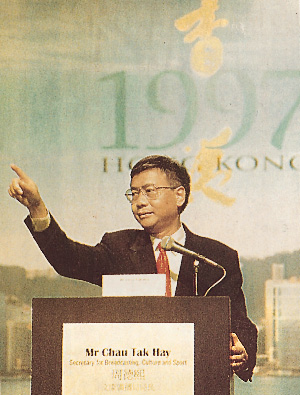 The Secretary for Broadcasting, Culture and Sport, Mr. Chau Tak-hay held a press briefing on the Broadcasting Development of Hong Kong at the Hong Kong Convention and Exhibition Centre on July 3,1997. Following is his speech. And in response to press inquiry about Radio Television Hong Kong, Mr. Chau reiterated that RTHK has always operated as a public broadcaster and it is editorially independent. Hong Kong government has never intervened in RTHK's editorial policy, and as from July 1, HKSAR government will continue the existing policy such that RTHK shall continue to have its own editorial autonomy and maintain its current mode of operation.
The Secretary for Broadcasting, Culture and Sport, Mr. Chau Tak-hay held a press briefing on the Broadcasting Development of Hong Kong at the Hong Kong Convention and Exhibition Centre on July 3,1997. Following is his speech. And in response to press inquiry about Radio Television Hong Kong, Mr. Chau reiterated that RTHK has always operated as a public broadcaster and it is editorially independent. Hong Kong government has never intervened in RTHK's editorial policy, and as from July 1, HKSAR government will continue the existing policy such that RTHK shall continue to have its own editorial autonomy and maintain its current mode of operation.
Ladies and Gentlemen,
Let me start by giving you a brief overview of the broadcasting scene in Hong Kong prefaced with a few words on our policy objectives.
Our core objective is simple and straightforward. It is to ensure that the people of Hong Kong have access to a wide variety of broadcasting services through the creation of an environment in which diversity and freedom of expression can thrive. We seek to achieve this goal by expanding the choice and improving the quality of broadcasting, while ensuring that such programmes do not offend public standards of taste and decency.
Until 1991, Hong Kong's broadcasting market was simple. We had just two terrestrial television stations, each with two channels, and two radio stations.
In the six years since 1991, the number of domestic channels in Hong Kong has grown from four to over 40. Many more satellite channels are receivable in Hong Kong. And the way in which people receive their television programmes has also been changing. TV programmes are now delivered not only by terrestrial broadcasters but also by satellite and cable broadcasters. Before long, television will be coming down the telephone wires, when Hong Kong becomes the first place in the world to have commercial-scale video-on-demand, or VOD, programme services.
The changes won't stop there. Next year, we shall undertake a comprehensive review of the television environment to see what further adjustments to the regulatory framework are required to keep Hong Kong at the forefront of broadcasting development.
The development of regional broadcasting has also been extraordinary. Since pan-Asian satellite broadcasting began with Hong Kong-based STAR TV just six years ago, many regional broadcasters have taken to the air. In addition to CETV, which broadcasts family programming to Chinese-speaking communities around Asia, several of the world's best known international broadcasters have chosen Hong Kong as their regional base. CNN, NBC, and the TNT/Cartoon Network are a few examples. And a few months ago, MGM Gold moved its regional headquarters to Hong Kong from another place in Asia.
Hong Kong is well placed to benefit from the expansion of broadcasting in Asia. To investors looking for a regional base, we offer a formidable combination of advantages. It is not surprising therefore that Hong Kong has become a major broadcasting hub in Asia. But we cannot afford to rest on our laurels. Hong Kong faces stiff competition from other locations in the region, we shall therefore be reviewing our policies on satellite TV broadcasters over the next few months to see how we can maintain and enhance Hong Kong's position as a regional broadcasting hub.
Both this and the 1998 policy review are likely to keep us busy over the next year or so. But even after that, we shall scarcely have time to draw breath before tackling the next task : the introduction of digital broadcasting. While it is likely to be some time before acceptably-priced consumer equipment is available, the technology is already being tested in Europe and North America. In the next few months, we will start to plan the options for digital radio. Thereafter, we shall tackle the introduction of digital television.
The Government can play an important facilitating role in these and other broadcasting developments. But if we are to make the most of such developments, we need to place consumers in the driving seat. This means maintaining a simple regulatory framework for broadcasting, which provides a level playing field and ensures that proper standards are met, but avoids unnecessary interference with the freedom of broadcasters to provide the services demanded by consumers.


